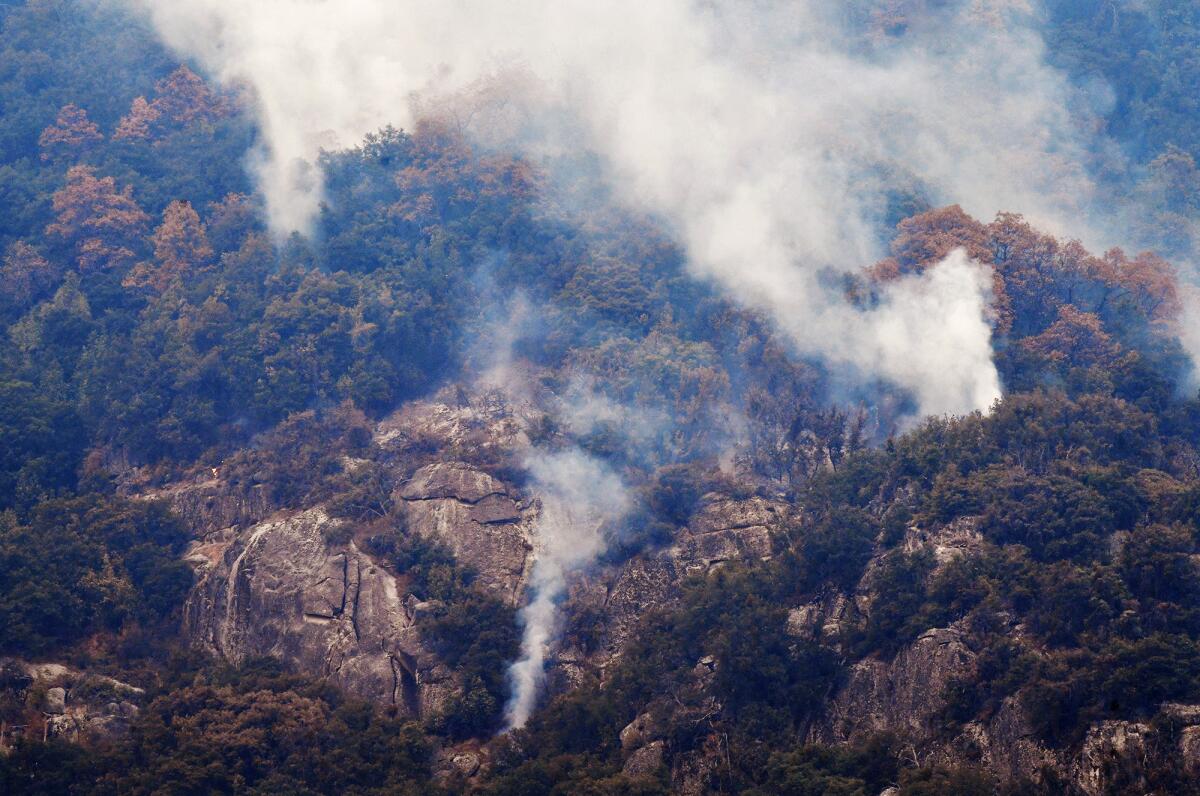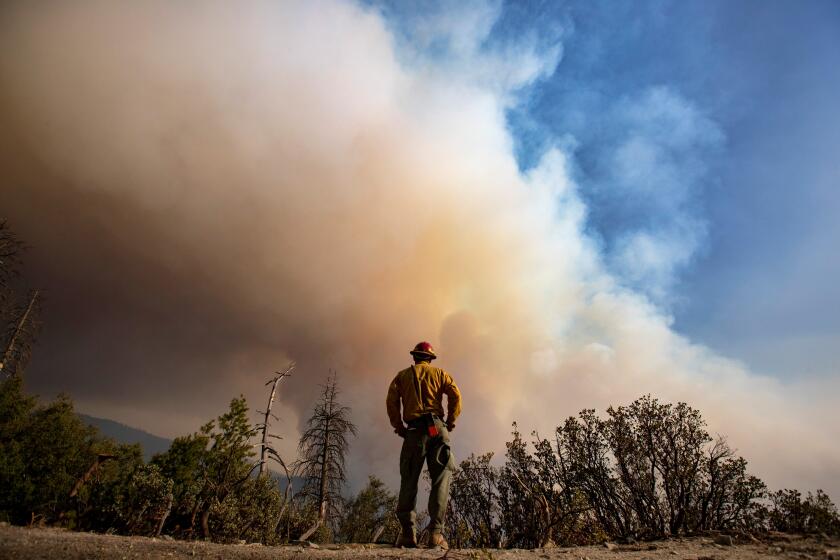KNP Complex fire spurs new evacuations as it forms massive pyrocumulus cloud

- Share via
The KNP Complex fire burning in Sequoia and Kings Canyon National Parks spurred new evacuations Monday as it formed a massive pyrocumulus cloud and made a leap toward dozens of historic cabins near the southern edge.
The Tulare County Sheriff’s Office issued evacuation orders for Mineral King Road from Highway 198 to the Oak Grove Bridge, and Mineral King Drive up to the Sequoia National Park boundary, directing residents to leave immediately.
The evacuations came just days after similar prompts on the fire’s northern and western perimeters, including orders and warnings spanning from Wilsonia to portions of Fresno. The latest evacuation map is available here.
Fire officials said a ridge of high pressure was trapping heat and smoke over the 67,708-acre blaze, which was 11% contained Monday as it continued to feed on drought-dried terrain and arid air.
“It’s just incredibly dry, incredibly dry,” said incident spokesman Daniel Patterson. “Definitely the factors are in place for a very active fire day today.”
Patterson said downslope winds sent embers flying over containment lines overnight, creating new threats for residents and homes along the fire’s southern border and prompting the latest evacuation orders.
By Monday morning, the fire was about four miles from the edge of Mineral King Road, he said, where about 65 historic cabins in Mineral King, Cabin Cove and Silver City were in the potential path of flames.
For weeks, fire crews have been clearing vegetation, running sprinklers and wrapping some of the century-old structures in protective foil. Many of the cabins are made of wood and are highly flammable.
“It’s a historic location that we’d like to preserve, not only for ourselves, but for posterity, for the public,” Mineral King District Assn. President John Crowe said recently.
Reached by phone Monday, Crowe said that some parts of the area had already been evacuated once by the KNP Complex and that the orders were reduced for a few days before being reinstated and expanded amid worsening conditions. The fire jumped a natural barrier known as Paradise Ridge, he said, and was creeping down the mountain toward Mineral King Road.
“Yesterday, I was guardedly optimistic,” Crowe said. “Last night and this morning’s events put a little cold water on that. We’re concerned.”
Officials with the Mineral King District Assn. said in a tweet Sunday that they were “hoping for the best.”
Firefighters are working to protect homes and giant sequoia groves from two wildfires burning in the southern Sierra.
But firefighters were facing challenging conditions as thick smoke limited visibility and kept some aerial operations grounded. A large pyrocumulus cloud was seen rising over the fire zone Monday.
“There is an active [cloud] right now,” said Dan Harty, a meteorologist with the National Weather Service in Hanford. “It looks like it’s producing a pretty good column that pretty much produces its own weather.”
The clouds, which can form over hot, smoky fires, have been known to generate fire whirls and lightning, which can spark additional blazes.
The San Joaquin Valley Air Pollution Control District extended its air quality alert through Tuesday, warning residents in at least nine surrounding counties of the potential for hazardous particulate matter from the KNP Complex and the nearby Windy fire.
Residents who can see or smell smoke are advised to stay indoors with windows and doors shut, use air purifiers when possible and wear masks if needed, officials said.
And while the southern edge of the KNP Complex was a top priority Monday, the blaze remained active on nearly every front, Patterson said.
Most of the beloved sequoia trees in the Giant Forest remained largely unscathed.
Meanwhile, crews were making progress on two other California wildfires, including the 94,746-acre Windy fire in Sequoia National Forest, which was 68% contained Monday.
Evacuation orders in the nearby California Hot Springs and Pine Flat communities will be reduced to warnings Monday afternoon, according to incident spokesman Jim Mackensen.
“We’re turning a corner on this one,” he said.
Mackensen said 14 residences, 10 outbuildings and two commercial properties have been destroyed by the fire.
The fire also seared several groves of giant sequoias and killed at least 30 trees, botanists said Friday. A complete assessment of tree damage remains ongoing.
Another warm, dry and breezy day was in the forecast Monday, Mackensen said, but the potential for precipitation later in the week was providing some hope.
The Fawn fire in Shasta County — which grew to nearly 8,600 acres and destroyed 185 structures during its 10-day run — was 100% contained, officials said.
More to Read
Sign up for Essential California
The most important California stories and recommendations in your inbox every morning.
You may occasionally receive promotional content from the Los Angeles Times.












